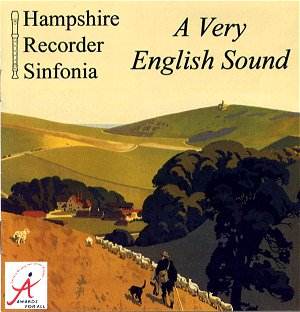I have to admit that until I came across this CD I
had never heard of a recorder orchestra, let alone heard one. Even more
astonishing is the fact that this is not the only one. The fascinating
CD booklet talks of fifty-strong recorder orchestras in London, Manchester
and the Midlands. By comparison the Hampshire one is small consisting
of almost thirty players (each one named in the booklet) who between
them play sopraninos, descants, trebles, tenors, basses, great basses
and contrabasses. The repertoire of such an ensemble is well represented
here in a balanced programme including original compositions by Colin
Hand and Brian Bonsor and special arrangements including an arrangement
of ‘Colonel Bogey’.
In Germany the first recorder orchestras seem to date
back practically fifty years. In Britain we can go back thirty years
to Dennis Bamforth’s orchestra in Manchester. The ‘Three Pieces’
by Warrick Kear (born 1950) were written in the early 1970s Bamforth’s
group. At that time contrabasses were unknown but with the composer’s
approval are used to strengthen the bass line here. These are intriguing
pieces which certainly caught and held my attention. They are, one might
say, not only harmonically questing but also ‘orchestrated’ with a feeling
for a variety of textures and accompaniments. These are good pieces
and worth knowing. Another good piece undoubtedly is the ‘Fantasia
a 6 No. 2’ by Byrd. The fecundity of Byrd’s imagination is remarkable.
Originally for a viol consort the Hampshire Sinfonia have jointly constructed
the piece for themselves; arrangement by committee, as it were and very
successful it is too. Again there is a variety of texture contrasting
solo and tutti sections. This is important because, especially for the
non-specialist, the monochrome sound of recorders may well tire the
ear. Even so, imaginative and clever music will hold your attention,
as with the unpromisingly titled ‘Variations on the Psalm Tune Southwell’
(1986) by Daryl Runswick (1916-1992). This takes the rather plain and
sober 16th Century tune through various styles from 10th
Century monody via early medieval organum into more typical 16th
Century harmonisations. Also included are a set of brief Elizabethan
dances and a Siciliano of Handel’s time "before a reassertion of
the plainchant" (to quote the notes). Runswick was quite a doyen
of the media and features elsewhere in this anthology.
Another fascinating piece is ‘Buskin’ by Andrew
Challinger (born 1950), which begins like a little African school song
but is in twelve parts and conceived "on polychoral lines akin
to the compositional procedure of Venetian chori spezzati"; apparently
four groups of instruments should be carefully positioned "to maximise
their antiphonal roles".
On the negative side some pieces are more of a trial
to listen to due to colourless arrangements or mediocre musical quality.
The latter may be all right in the music’s original state but is not
enhanced by the recorder orchestra. I’m afraid the arrangement of ‘Colonel
Bogey’ comes into that category, as does ‘The Arrival of the
Queen of Sheba’. And the close harmonies of ‘A Nightingale sang’
just sound out of tune. This arrangement’s emphasis on the tune being
exclusively in the descant part is rather trying and the piece loses
its romance.
‘The English Folksong Suite’ poses another problem.
One knows the music too well in its more familiar versions for brass
band or orchestra. These offer much more colour and variety of timbre.
Obviously the recorder orchestra cannot offer that so much enjoyment
of the music is consequently removed. The dynamic tends to stay at one
level for too long and again the ear can tire. Do recorder orchestras
ever include percussion? It might add an interesting contrast.
Of recent pieces specially composed for this ensemble
or for others, Colin Hand’s characteristically fascinating and nicely
contrived ‘Fanfare’ written in the mid-1960s shows the composer’s
true empathy with this kind of ensemble. Of course he is well known
as a composer of woodwind music. His works are particularly enjoyed
by young musicians. The arrangements of Giles Farnaby's keyboard pieces
by Daryl Runswick work very well and sound authentic; the recorder suiting
the music ideally. These pieces are identical to the ones Rubbra orchestrated
in the 1940s. Incidentally Rubbra wrote well for solo recorder.
Recorder tuning is always a problem but mostly it is
remarkable how it rarely strikes one as such on this CD. The ensemble
is generally excellent although I suspect that the ending of the VW
Folksong suite might have benefited from a re-take.
The enclosed booklet is excellent, with fine colour
photographs of the recording sessions and venue and players. There are
useful notes about each piece and an enthusiastic essay on recorder
ensembles/orchestras by Chris Burgess himself. It is a pity that the
convention of printing the track timings was not followed through, but
this and its companion disc of 1997 are unique documents and anyone
with a semblance of interest in this unusual repertoire should contact
the orchestra’s website at www.hants.gov.uk/hrs,
where I believe, the CDs can be purchased.
Gary Higginson

